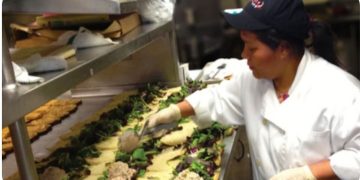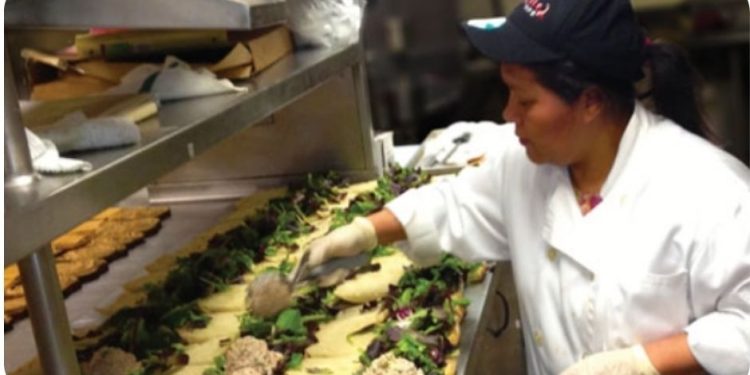Kevin Westlye admits he was a holdout when it came to going with fresh-cut produce for his company’s airport Firewood Cafes and Firewood Grills in the San Francisco area.
But when he realized he could get fresh-cut romaine, greens and fruit of quality comparable to that of the produce his employees were cutting every day, he made the switch.
Today, High Flying Foods’ Firewood restaurants at the San Francisco International Airport and nearby Oakland International Airport receive daily deliveries of fresh-cut produce via Pacific Produce in South San Francisco. The restaurants serve several thousand meals a day, and the company is poised to grow.
The company operates a commissary out of the San Francisco airport to serve its restaurants there, which includes four Firewood Grills and Cafes, along with eight Peet’s Coffee & Teas. The commissary also serves a Firewood Café at Oakland Airport. In addition, they operate six restaurants in northern California and Glendale.
The company is also operating two temporary restaurants in San Diego, where eight restaurants are under construction at the airport there with well-known brand partners around the San Diego area. A third-party commissary is servicing the short-term locations and will expand to serve the new eateries.
“Airports, when they do their requests for proposals, mandate only a certain square footage can be allowed for your kitchen, and in most airports that’s 15 percent,” he said. “Let’s say you have a 1,000-square-foot restaurant, which is considered large in an airport. It leaves you a room 10-by-15 to prep and store.
“So we’re buying what we can pre-cut, as long as the quality is identical. It’s clearly something that airport operators need to do.”
That means buying premixed baby lettuce, or coastal greens, as the company refers to them. The restaurants sell a lot of Caesar salads, and now purchase pre-cut romaine.
“In terms of space, rather than bringing in a case of romaine, which we then need space to cut and wash, and then drain, basically we can bring it in and it’s already cut, washed and drained,” Westlye said. “It’s a huge space savings for basically the same quality.”
The restaurants do fruit cups that they assemble themselves from fresh-cut melon, grapes and strawberries in season, going through about eight 5-gallon buckets a day.
“It was more of just being open minded to try and take a look at what products were in the marketplace,” Westlye said. “In pre-cut produce, we’ve found the industry has come so far that the quality is as good as what we can cut ourselves.”
Sarah Garcia, president and co-owner with Jennifer Smith of Pacific Produce, said she and her staff worked closely with some fresh-cut processors to arrive at a model that worked for High Flying Foods. On the fruit side, they tried several different mixes until they settled on the one the company uses today.
Her company also went to seven-day delivery to accommodate High Flying Foods’ desire to receive fresh product daily.
High Flying Foods tracks sales and can pretty accurately predict what its restaurants are going to need each day. That makes it easy to order daily for the following day’s delivery.
“The fruit is cut at night, delivered to us at 4 in the morning, is on our shelves at 4:30 and we discard whatever is left at 10 p.m. when we close,” Westlye said. “We have a 24-hour shelf life because we want it to be amazingly fresh.
“And it is.”
Garcia said that required her processing sources to be flexible and reliable. For that reason, Legacy Foods in San Francisco has been a primary supplier of the fresh-cut products for High Flying Foods.
“They’re willing to chop it fresh each day,” she said. “They were willing to let us source the fruit if we didn’t like what they were getting. And they were also willing to package it in such a way that we don’t even break the seal.”
The fruit arrives in plastic, sealed tubs that are delivered directly to the customer.
“The plastic tubs are then recycled and used again,” Garcia said. “The important thing is it preserves the taste. Nothing is getting in there, just fresh fruit and there’s also a safety factor.”
Garcia and Smith bought Pacific Produce four years ago. Theirs is the only woman-owned distributorship operating in the two San Francisco area produce terminals. Besides produce, they handle dairy, nuts, spices and source other items when customers ask for them. They’re also particular about where they get their products and have a farm-direct program.
The company was doing some fresh-cut business when she and Smith took over, but it’s a niche that Garcia said has continued to grow.
“That’s because of a couple of things,” she said. “First of all, the convenience factor for the customer – that’s a big deal. And the other thing is, too, that in the fresh-cut places, they’re trained, they can do it to a very high level of specificity so you can say, ‘I want these red onions and I want a quarter inch, a half inch,’ and they have the equipment to do that.”
Westlye said going to the fresh-cut products has probably resulted in some labor reduction. But instead of banking the savings, the company has been able to use it to expand fresh menu offerings.
“People are eating healthier, and airports have welcomed us because, frankly, we don’t use any frozen food,” Westlye said. “We’re doing a farm-to-table approach.
“Ultimately, customers are looking for quality in airports today, and a huge part of quality is freshness.”
- Latest
- Trending































